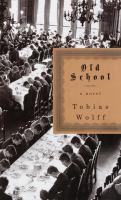
Tobias Wolff, who teaches creative writing at Stanford, has led an interesting life. His success comes despite a precarious childhood, from which he escaped through a combination of quick wit and good luck. So it’s no surprise that his novel Old School, which draws on his personal experience, is a fascinating exploration of the precarious nature of class and social status.
During his last year at an elite prep school, the nameless narrator in the novel is desperate to win one of three contests. The winner gains an exclusive audience with a visiting writer. The narrator fails to impress Robert Frost and is too ill to even compete for the privilege of meeting Ayn Rand. By the time Earnest Hemingway’s visit approaches, the boy is in a frenzy to succeed. The parallels between the Old School narrator and Tobias Wolff are undeniable. In fact, in an interview with “The Stanford Daily” Wolff admits “I couldn’t have written it without having gone to a school like the one I’ve described. A lot of the novel is drawn from memory, but I was not faithful to it…much has been indented to give shape to the novel…Of course, the narrator’s anxieties about class, identity and other issues are things I share with him.”
Those who are familiar with Tobias Wolff’s previous work, especially his autobiography This Boys Life, will know that Wolff is well-versed in telling lies. His father, as Wolff and his brother Geoffrey have both written, was a fantastic con man that lived under several aliases. So when the younger Wolff saw an opportunity to escape the dysfunctional home of his violent step-father, he expanded on his well-honed fibbing skills to forge the necessary documents not only to be accepted into an elite prep school, but to receive a scholarship as well. While his time at the school was idyllic, he was eventually expelled. The Old School narrator, not unlike Wolff, is isolated by his socio-economic status and depends on his classmates to entertain him on holidays. The narrator has recently learned that his father was Jewish, and asks himself “if I’d learned that my father was descended from Southern Baptists, would that make me a Southern Baptist?” He is continually plagued by questions of his own identity. His roommate, whose father is Jewish, neither acknowledges nor denies his religion. They never discuss it, and thus deny the opportunity for our narrator to express his feelings about his recent discovery. There is no outlet for expression or exploration of what this knowledge means to him. I was not surprised to learn that Wolff had recently discovered his own Jewish ancestry. Old School became a place for Wolff to explore his new-found knowledge.
When the narrator’s prize-winning essay of isolation and deceit is revealed to have been plagiarized, the reader feels an overwhelming sympathy for him rather than disgust. I was able to see how strongly the narrator identified with the original story and understand how and why he took ownership of the story without being its true author. Old School, therefore, becomes an exploration of the facets of isolation and deceit. Is there a time when untruth can be forgiven, and if so, how can we truly know when those times exist? Early in the novel, the narrator unwittingly, yet deeply, offends a Jewish custodian. As he is called to account for his abominable actions, it's plain, even to the headmaster, that the incident was a horrid misunderstanding and that the boy felt terrible about it. He knew he had hurt someone, and grieved even though the insult was unintentional. How can this same, promising student so blatantly take what is not his? How can one determine intent and how does a lack of self knowledge play into forgiveness? By the novel's end, on a chance meeting with a former dean, the narrator learns that duplicity is a fact of life for everyone. By then, he has become a successful writer, despite the humiliating outcome of the plagiarism incident.
